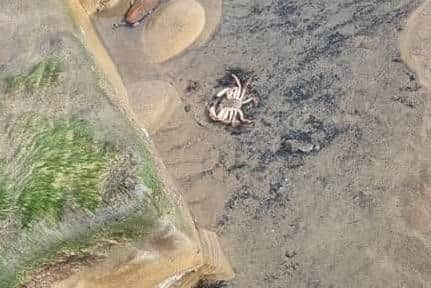Fisheries Minister Victoria Prentis offers reassurance to people in Hartlepool after mass death of crabs and lobsters
and live on Freeview channel 276
Whilst a rare occurrence, we have seen similar incidents in the area before. In March 2018, a combination of storms, spring tides and low temperatures caused some 10.5 million creatures to wash up along the East Yorkshire coast.
Understandably, there is huge concern about these events. In 2019, fish landings into the North East were worth £26million, with shellfish in particular accounting for £14million (and crabs and lobsters making up £11million of this).
Advertisement
Hide AdAdvertisement
Hide AdI know the most recent wash-up is still the subject of intense local debate, and I am grateful to Jill Mortimer for inviting me to speak about the matter with her today, how it is affecting local businesses and what more we can be doing to support coastal communities such as this.


Defra led a thorough multi-agency investigation to get to the bottom of what happened, drawing on the expertise of the Environment Agency, Centre for Environment, Fisheries and Aquaculture Science (Cefas), North East Inshore Fisheries and Conservation Authority (NEIFCA), Marine Management Organisation (MMO), Food Standards Agency (FSA) and the UK Health Security Agency (UKHSA).
Extensive and rigorous tests were carried out to investigate various potential causes, including dredging activity, chemical contamination, activities related to offshore windfarms, the presence of algal blooms and aquatic animal disease.
A naturally occurring harmful algal bloom was found to be the most likely cause of the incident. Satellite imagery and consistent detection of algal toxins in shellfish support this theory.
Advertisement
Hide AdAdvertisement
Hide AdThe Environment Agency tested samples from along the coast and Tees estuary, including using new techniques to look for a wide range of chemicals within the tissue of the affected crabs. None of the results from these tests showed levels of any contaminants that could have caused an event of this spatial scale or duration.


In particular, I want to stress that while elevated indicative levels of pyridine were detected in crab tissue samples, this could not be linked to any significant source of pyridine in the local environment.
Pyridine was also detected in otherwise healthy crabs outside the area. For pyridine or any contaminant to have caused this incident, it would need to have been present in huge quantities to counteract the powerful dilution effect of the sea - and this was not the case.
Samples of dredge material must meet the highest international standards protecting marine life before it can be disposed of at sea.
A review of dredging activity as part of the investigation found no evidence of a link between the disposal of dredged sediment and the deaths.
The sampling of sediment that was licensed by the MMO for disposal at designated sites off the Tees confirmed no chemical determinants exceeded concentrations that would be harmful to marine life, and dredging was therefore ruled out as a likely cause.
Advertisement
Hide AdAdvertisement
Hide AdThis investigation has now concluded but I want to be very clear that we have not stopped listening.
I know fishermen and residents have voiced concerns about recent small-scale wash-ups along the North East coast and I want to reassure you that we are working closely with our partner agencies to assess and monitor the situation.
Samples of the crabs and lobsters from these wash-ups are currently being examined by scientists at Cefas. Defra will share the outcome of this testing once it becomes available.
All reports of dead or dying marine life in the area are monitored through the North Eastern Inshore Fisheries and Conservation Authority (NEIFCA).
We are in regular contact with the teams on the ground.
I encourage fishermen and residents to report any concerns to NEIFCA.
Advertisement
Hide AdAdvertisement
Hide AdInvesting in coastal communities like Hartlepool is a priority for the Government. Freed from the Common Fisheries Policy, we can do so much better for our fishing industry.
We have already seen an uplift in quotas and our £100million UK Seafood Fund is supporting innovation, skills and job creation around our coastline.